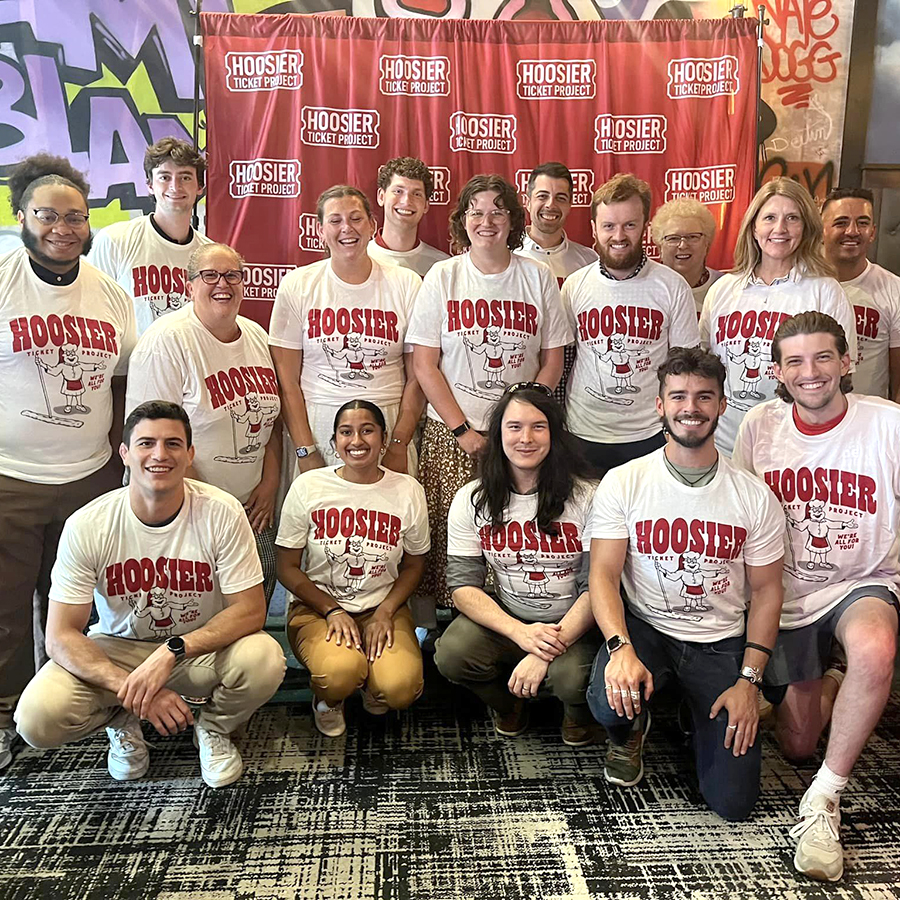BLOOMINGTON, Ind. - The Hoosier Ticket Project started with a simple goal: Removing financial barriers that prevent fans from attending Indiana University athletic events by leveraging the generosity of alumni and fans.
Over the past three years, the Hoosier Ticket Project has allowed hundreds of fans to experience Hoosier gameday for the first time, but the finer points of running a nonprofit organization took a backseat to the main focus of the effort.
Enter the Paul H. O’Neill School of Public and Environmental Affairs.
Leveraging the expertise of the school’s faculty and students, the Hoosier Ticket Project partnered with O’Neill Online Week to provide support and a blueprint to help the burgeoning organization grow.
“Our launch as a nonprofit has always involved IU, but mostly on the alumni side,” said Josh Bruick, CEO of the Hoosier Ticket Project. “A big vision that we’ve always had is to really get involved with the student body at IU, and there was no better way to do that than with the O’Neill School. It provides a great benefit for us, and the evaluation and development strategies the class produced for us will only improve our program.”
Like Bruick, Hoosier Ticket Project COO Jason Gerdom is an IU graduate, and he has heard fellow alumni talk about how programs at IU have helped their businesses and organizations. That planted a seed in his mind.
“I thought to myself, ‘We’re a nonprofit, and we have one of the best nonprofit programs in the country at the O’Neill School,’” Gerdom said. “After exploring some of the opportunities that IU provides, we were invited to be part of this course for O’Neill Online Week, and it has worked out great.”
Gerdom met with the class early in the week to take questions from students about the organization. The Hoosier Ticket Project also invited some IU student-athletes to speak to the class about what the effort has meant to the fans and IU athletes.
“I was so impressed with the questions the students were asking,” Gerdom said. “A lot of the questions really challenged me to think about the nonprofit in ways I hadn’t before. They were causing me to think more future-oriented or operational-oriented, and the depth and breadth of the questions they were asking to get information out of us was really impressive.”
Clinical Professor Laura Littlepage is the instructor of the class, which provides students the opportunity to gain experience that directly translates to what they’ll face in their careers after graduation.
“The week is really intense,” Littlepage said. “They have to work long hours, and they have to react to a client’s needs very quickly. Sometimes in life, you have a very short turnaround on a project, and it’s important to be able to adapt. They’re actually sometimes amazed at how much they’re able to get done.
“It’s also more meaningful to have a real project that makes an actual impact than just working on something theoretical, and it interesting to see the students take on various roles and figure out how to make the most of the project.”
Besides the benefit of the consultation the class provided, the Hoosier Ticket Project also received a dose of perspective.
“Laura reminded me that we’re still a young nonprofit,” Gerdom said. “It’s OK that we feel disorganized at times because we’re all learning. Josh and I are professionals with full-time jobs, and it’s fun to be able to use those skills to build the Hoosier Ticket Project. We’ve been so fortunate that we have a lot of people willing to trust us with their donations, and we feel like we’ve shown we can handle them responsibly. But we’ve also had the same board members since we started, and we know we need to expand. How do you vet board members? Are the bylaws structured correctly? How do we make sure new board members are aligned with our vision? How can we best structure and improve stewardship and development? Those are all areas that O’Neill Online Week will help improve for us.”
The Hoosier Ticket Project hopes to grow to the point it can give back to O’Neill by establishing an internship program in the future, the roots of which will depend on implementing the advice provided by this year’s class.
“We’re three years into this, and now that we’ve established our space, we can go one of two ways,” Bruick said. “We can improve our reach and grow, which is what we intend to do, or we can stay stagnant, which is what we don’t want to do. It’s a pivotal time for us as an organization, and what better way to make sure we head in the right direction than to involve students who have the expertise to show us the path toward growth? I really hope we can stay involved with the school moving forward, because this experience has been tremendous.”
Gerdom agrees.
“We have found an awesome partner in the O’Neill School,” he said. “We’re helping the students, and they’re helping us. It’s a fantastic relationship, and I encourage other nonprofits that are looking for help to get involved with the O’Neill School as well.”


